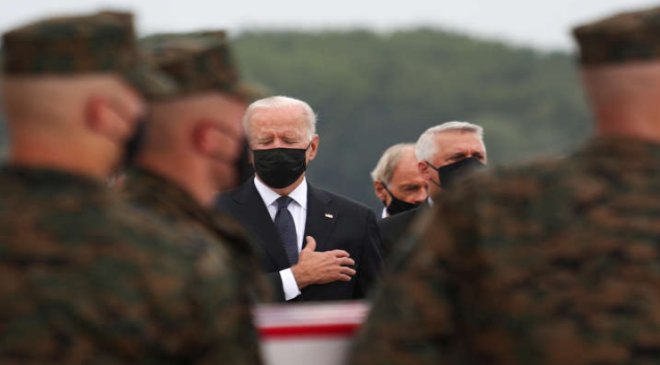WASHINGTON—The U.S. said it launched a drone strike targeting suspected suicide bombers near the Kabul airport Sunday as America’s 20-year war in Afghanistan wound down to its final hours.
The drone strike was the second such attack following the explosion that killed 13 U.S. service members and more than 200 Afghan civilians at the Hamid Karzai International Airport last week. It came as the U.S. scrambled to have its military and diplomatic personnel out of the country by Tuesday, the deadline previously agreed upon by the Taliban before it would take
control of the airport in Kabul.
The drone took aim at a vehicle carrying suspected suicide bombers, the Pentagon said. The U.S. believed it successfully struck the vehicle, but couldn’t say how many bombers were hit.
A senior Afghan health official, who also worked with the U.S.-backed government, said the Sunday strike killed five civilians and hit a house.
In a statement, U.S. Central Command, which is responsible for military operations in Afghanistan, said it was aware of reports of civilian deaths from the strike and is “still assessing the results of this strike.
“We know that there were substantial and powerful subsequent explosions resulting from the destruction of the vehicle, indicating a large amount of explosive material inside that may have caused additional casualties,” Centcom said in its statement. “It is unclear what may have happened, and we are investigating further.”
The Pentagon initially had said it wasn’t aware of civilian deaths from the strike.
The Biden administration said it remained committed to Afghanistan after Tuesday’s final withdrawal, even as the U.S. presence faded fast amid mounting security concerns.
America’s final exit from Afghanistan raises the prospect that thousands of Afghans who worked alongside American forces, diplomats and humanitarian groups could be left behind. It also compromises the international community’s ability to protect women and girls and certain religious minorities, which are considered particularly vulnerable to persecution by the Taliban regime.
On Sunday, President Biden and first lady Jill Biden met with the grieving Gold Star families of the 13 service members lost in a suicide bombing outside the airport last week. The families were at Dover Air Force Base in Delaware for the arrival of their loved ones’ remains, and the president, Dr. Biden, top military leaders and members of the national security team were at the airfield as troops removed the transfer cases from the military aircraft.
Later in the day, at a briefing on Hurricane Ida at FEMA headquarters, Biden spoke briefly about the deceased and their families.

“While we’re praying for the best in Louisiana, let’s keep them in our prayers as well,” Mr. Biden said. He declined to take questions on Afghanistan.
Early Saturday, the U.S. conducted airstrikes against ISIS-K, the group that claimed responsibility for Thursday’s attack, killing two individuals whom the Pentagon described as a planner and a facilitator.
Mr. Biden warned in a statement on Saturday that another attack was highly likely and said he ordered his military commanders to “take every possible measure to prioritize force protection.”
Almost all remaining U.S. Embassy staffers had already packed up and left Kabul by Sunday, to allow enough time for thousands of U.S. personnel and equipment to be sent home, essentially bringing to an end the potential for further mass evacuations, a U.S. official said.
Fewer than half a dozen consular services people will remain on a temporary basis but their role in evacuating any remaining applicants will be limited, the official said.
On Sunday, Secretary of State Antony Blinken all but ruled out a U.S. diplomatic presence in Afghanistan after Tuesday.
“That’s not likely to happen,” he said on NBC, adding that the U.S. is committed to helping people leave the country before or after the U.S. withdrawal.
“There’s no deadline on that effort,” Mr. Blinken said. “We have mechanisms to help facilitate the ongoing departure of people from Afghanistan if they choose to leave.”
In a joint statement Sunday, the U.S. and nearly 100 countries declared their commitment “to ensuring that our citizens, nationals and residents, employees, Afghans who have worked with us and those who are at risk can continue to travel freely to destinations outside Afghanistan.”
“We have received assurances from the Taliban that all foreign nationals and any Afghan citizen with travel authorization from our countries will be allowed to proceed in a safe and orderly manner to points of departure and travel outside the country,” the statement said.
French President Emmanuel Macron said France is drafting a plan to create a safe zone in Kabul monitored by the United Nations that would allow evacuations and humanitarian operations to continue after Tuesday’s deadline.
France and the U.K. are planning to submit the plan to the United Nations Security Council when it meets Monday, Mr. Macron said in an interview with the French publication Le Journal du Dimanche.
As of Sunday morning, about 2,900 people were evacuated from Kabul over the previous 24-hour period, according to figures released by the White House. Since Aug. 14, the U.S. evacuated and facilitated the evacuation of approximately 114,400 people, including nearly 5,500 American citizens.
About 250 Americans have informed the administration that they are still trying to leave the country as of Sunday, the State Department said.
In a new security alert issued early Sunday in Kabul, the State Department advised all U.S. citizens to immediately leave three of the airport’s gates and avoid traveling to the airport, citing a “specific, credible threat.” Hours later, the Pentagon said it launched a new set of attacks.
On Saturday, the Pentagon released the names of the 13 Americans—11 Marines, a Navy corpsman and an Army soldier—killed Thursday in Kabul when a suicide bomb detonated outside the airport gates. Another 20 service members were wounded in the attack that also killed more than 200 Afghans who were among the crush of people trying to get into the airport.
The attack raised concern about whether the Taliban would work to prevent Afghanistan from once again becoming a haven for extremist groups such as ISIS-K, which in recent years had significantly increased in strength, force size and capabilities by obtaining supplies and recruits through smuggling routes on the Afghanistan-Pakistan border, despite the U.S. presence in the country.
Since the fall of Kabul to the Taliban on Aug. 15, which happened faster than the administration or any U.S. intelligence assessments had predicted, the U.S. has been forced to rely on the Taliban to review paperwork, manage crowds and help to handle security around the airport.
White House officials said there was no evidence signaling that the Taliban colluded with ISIS-K perpetrators in Thursday’s attack, but they remain wary of possible collaboration.
“No one here trusts the Taliban. No one here is counting on any words the Taliban offer,” Mr. Biden’s national security adviser Jake Sullivan told CNN on Sunday. “What we are focused on is actions.”
Mr. Sullivan added that the U.S. hasn’t provided a list of names of potential special immigrant visa holders to the Taliban, and any reports suggesting as much were “unfounded and inaccurate.”
Republicans have criticized the Biden administration’s handling of the U.S. pullout.
Senate Minority Leader Mitch McConnell said on Fox News on Sunday that Afghanistan could be “much worse” than the 1975 fall of Saigon, “because after we left Saigon, there weren’t Vietnamese terrorists who were planning on attacking us here at home.”
“This is one of the worst foreign policy decisions in American history,” he said.
Mr. Blinken said the U.S. will retain the capacity “to find and to take strikes against terrorists who want to do us harm.”
“In country after country, including places like Yemen, like Somalia, large parts of Syria, Libya, places where we don’t have boots on the ground on any kind of ongoing basis, we have the capacity to go after people who are trying to do us harm,” he told NBC.







































